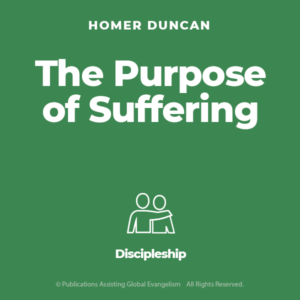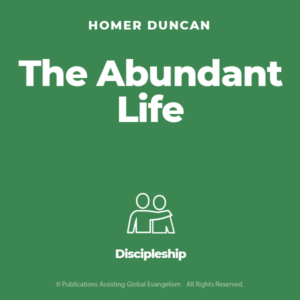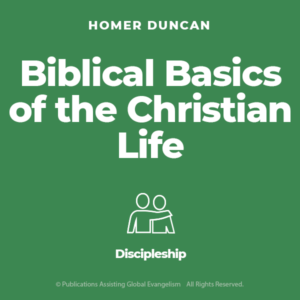Discipleship
THE ABUNDANT LIFE
By Homer Duncan
Missionary Crusader
The Lord Jesus Christ came into the world that we might have life and that we might have it more abundantly. He is the source of all life. “In Him was life, and the life was the light of men” (John 1:4). Without Christ, all men are dead in trespasses and sins (Ephesians 2: 1). We were born having physical life; we must be born again in order to have spiritual life. That is why Jesus told Nicodemus, a fine, moral, religious man, “Ye must be born again” (John 3:7). Our first birth made us a child of wrath because of the sin nature we inherited from Adam (Ephesians 2:3). The second birth makes us a child of God. Our first birth gave us our human nature; our second birth made us a partaker of the very nature of God (2 Peter 1:4). When we are born again, Christ is formed in us (Galatians 4:19). He lives in us (Colossians 1:27). He is our life (Colossians 3:4). We are born again by receiving the living Christ into our hearts (John 1: 12,13).
GOD’S GREAT PURPOSE
God’s great purpose in redemption is not merely to save us from hell and to take us to heaven, but it is His will and purpose that we should be conformed to the image of His Son (Romans 8: 29). It is not only His will that we should be born again, but that we should grow up unto the measure of the stature of the fullness of Christ (Ephesians 4:13).
Being conformed to Christ does not merely mean that we shall be like Him in physical appearance. It means that His nature and character shall be ours. All of the testings, trials, and heartaches that come to us are for the purpose of making us like Him (Romans 8:28, 29).
If we are to be made like Christ, we must know Him; we must know the power of His resurrected life; we must enter into the fellowship of His sufferings; we must be made conformable unto His death (Philippians 3:10). As we are conformed to Christ, His motives, desires, and purposes will become ours. We shall be holy in life, fervent in spirit, compassionate in heart, delighting, as He did, to do the will of God.
God’s great heart of love takes in the whole world. He was in Christ reconciling the world unto Himself (II Corinthians 5:19). He is not willing that any should perish, but that all should come to repentance (2 Peter 3:9). He not only wants us to be like Christ, but He desires to work through us to bring others to Christ, that He might be the firstborn among many brethren (Romans 8:29). As Christians, we are members of the body of Christ, the Church (Colossians 1:18). This body is composed of redeemed sinners from every kindred, tongue, people, and nation (Revelation 5:9). That is why Christ commands us to go into all the world and make disciples of all nations (Matthew 28:19). He has not commanded us to convert the world or even to reform it. We are not to try to get men to make a profession of faith. We are not to try to get “joiners.” We are nowhere told to “try to bring in the Kingdom.” We are told to yield ourselves to God so that He can accomplish His purpose through us.
GOD’S AND MAN’S PROGRAM CONTRASTED
What a contrast there is between the purpose of God and the program of men! Our churches are filled with people, a great number of whom have never experienced the saving grace of God. Most of those who have been saved are quite satisfied with themselves because they have received Jesus as Savior. They have made a public profession of faith, have been baptized, and have been received into the membership of the church. They have quit some of their bad habits, and have an office in the church. They are regular in attendance, and they are doing the best they can to live the Christian life. What more can anyone do than this?
We need to be reminded that the Christian is not a repaired sinner, but that he is a new creature in Christ. It is utterly impossible for us to live the life that God expects of us in the energy of the flesh. Let us look into God’s book for a few minutes and see some of the things He expects and requires of us. We are to love one another as He loved us (John 13: 34). We are to forgive others as He forgave us (Ephesians 4:32). We are to walk as He walked (I John 2:6). We are to rejoice in the Lord always (Philippians 4:4). We are to give thanks in everything (I Thessalonians 5:18). We are to love our enemies (Matthew 5:44). We are to be pure in heart (Matthew 5:8). We are to be holy in all manner of conversation (I Peter 1: 5). We are to pray without ceasing (I Thessalonians 5:17). We are to be fervent in spirit, serving the Lord (Romans 12:11). We are to be zealous of good works (Titus 2:14), always abounding in the work of the Lord (1 Corinthians 15:58). We are to witness to those around us and have a part in proclaiming the gospel to the ends of the earth (Acts 1: 8).
These are just a few of the requirements of a Holy God. No man can live such a life in his own strength. As we take these requirements one by one and face them honestly, each of us must be compelled to admit that we fail at every point. Many believe that these standards are so high that we can never reach them, that God never had intended that we should reach them, but that as we strive to live in this way, we shall be made stronger because of our efforts.
GOD’S PERFECT PROVISION FOR US
God has not only planned for us the highest, the best, and the greatest salvation that a Holy, All-wise, Loving, Heavenly Father could conceive; but He in infinite wisdom and grace has also provided the means whereby the realization of His purpose may be brought about in our lives. All that He commands us to do, He will enable us to do.
His infinite resources are at our disposal. The unsearchable riches of Christ are ours for the taking. God is for us (Romans 8:31). He wants us to know and experience the exceeding greatness of His power (Ephesians 1:19). The Lord Jesus Christ, the All-Powerful, Eternal Son of God, dwells by faith in the heart of the humblest believer (Colossians 1:27). The blessed Holy Spirit of God dwells in us to reveal Christ to us and glorify Him through us (1 Corinthians 2:10, John 16:14).
The work of God in the salvation of souls is greater than the work of God in creating the universe (compare Psalm 19:1 with Isaiah 53:1). The atoning, substitutionary death of Christ at Calvary is the foundation of all that God does for us. Without the Cross-I say it reverently-neither God nor man can do anything for the salvation of a ruined sinner. The Cross is the basis of our justification, reconciliation, and regeneration; but these stupendous transactions are not the end of our salvation, but the beginning. Having been reconciled to God by the death of His Son, we are now to let the living, resurrected Christ live in us. We are saved by His life (Romans 5:10). When we are saved, we are made partakers of the very nature of God (2 Peter 1:4). Our bodies become the temples of the Holy Spirit (1 Corinthians 6:19). Christ has redeemed our bodies that He might live in them as His own body. Some make much of the sin of robbing God of tithes and offerings; how much worse is the sin of robbing Christ of the body that belongs to Him. The Christian life is the Christ life. It is not our doing the best we can with the help of God. It is Christ living in and through us. He must be all, and in all (Colossians 3:11). He is in us; we are in Him (John 14:20). We are complete in Him, in whom dwelleth all the fulness of the Godhead bodily (Colossians 2:9,10).
OUR THREE GREAT ENEMIES
In spite of God’s great purpose for us, and in spite of His perfect provision for us, our churches are filled with beggarly, barren, bankrupt Christians. God has promised us power, but we are powerless. It is the will of God that we should be fruitful, but we are barren. It is the will of God for us to be Spirit-filled, but we are self-filled. It is the will of God for us to evangelize the world, yet more than half the people in the world have never heard the name of Jesus. We think that we are rich and increased in goods, and know not that we are “wretched and miserable and poor and blind and naked” (Revelation 3:17).
In view of the greatness and power of God, why is it that His Church is in such a deplorable condition? The Christian has three great enemies that must be overcome. Our first and greatest enemy is self. Our greatest sin is the sin of unbelief. Self gets in the way and keeps us from utilizing the unlimited resources of Christ. Our other -two enemies are the world and the devil. God permits these enemies to assail us so that we may learn to trust Him. He wants to teach us that we are nothing, that we have nothing, that we can do nothing. He wants us to find our all and all in Christ. If God were to take us to heaven without conflict, we would be characterless, spineless jellyfish. The oak becomes strong and mighty as the storms beat upon it. Jesus learned obedience by the things that he suffered (Hebrews 5:8).
SATAN, OUR ENEMY
The Devil is our enemy because he is the enemy of God. His great purpose is to defeat the purpose of God in our lives. He is wise, powerful, and subtle. He is a murderer, a liar, and a deceiver. Most of the people in the world are in his power (Ephesians 2:3, 1 John 5:19, Revelation 12:9). (The Revised Version renders 1 John 5:19, “And we know that we are of God, and the whole world lieth in the evil one.”) He is the god of this world (2 Corinthians 4:4). His methods are many and devious (2 Corinthians 2:11 ).
His great sin is that he set his will against the will of God (Isaiah 14:13, 14). He now goes about as a roaring lion, seeking whom he may devour (I Peter 5:8). He is doomed to burn forever in hell (Matthew 25:41, Revelation 20:10). For this reason, he wants to damn the soul of every sinner that he can.
For this reason, he wants to mar and ruin the life of every Christian. We hear his insidious hiss in the Garden of Eden when he made Adam and Eve doubt God by quietly asking, “Hath God said?” (Genesis 3: 1). He still whispers the same words from apostate pulpits, from theological chairs, from the lips of college professors. He is a devil, a monster of iniquity, a destroyer; but he likes to clothe himself as an angel of light so that he can more successfully deceive others (2 Corinthians 11:13-15).
God and the devil are constantly battling for the soul of the sinner and the life of the saint. God made man with a free will. He can either yield himself to God or to the devil (James 4:7). This is true of saint and sinner. We are not to give place to the devil (Ephesians 4:27). If we give him an inch, he will take a mile. Jesus conquered and overcame Satan because he could say, “He hath nothing in me” (John 14:30). The Devil is a defeated foe. We must learn to resist him (James 4:7). When we put on the whole armor of God (Ephesians 6:10-18), we are more than conquerors through Christ (Romans 8:37).
THE WORLD, OUR ENEMY
The Church of the Lord Jesus Christ is being robbed of its power today because so few Christians know the meaning of a scriptural separation. Separation is not only “from,” but it is also “unto.” In all ages, God has sought for a separated people. Abrahams obeyed God and left the Ur of the Chaldees that through him God might start a new nation. Israel was to be separated from all other nations on the face of the earth. They marred the purpose of God and brought God’s judgment upon themselves because they mixed with other nations around them and worshiped their gods. The Church is a called-out, separated assembly. We are not to try to reform, to civilize, or even to “Christianize” the world. We are to come out from it. We are to evangelize it. God is taking out of the world a people for His Name (Acts 15:14). The New Testament is filled with verses that teach us what our relationship to the world should be. “Be not conformed to the world: but be ye transformed by the renewing of your mind” (Romans 12:2). Christ gave himself for our sins, “that He might deliver us from this present evil world” (Galatians 1:4). The Christian is to keep himself unspotted from the world (James 1:27). Those who are friends of the world are called adulterers and adulteresses (James 4:4). We are not to love the world or the things that are in the world. If we love the world, the love of the Father is not in us (I John 2:15).
Egypt in the Scriptures is a type of the world. One hundred and sixty times in the Bible you will find the expression “out of Egypt.”,’ We are to come out of the world. “Wherefore come out from among them and be ye separate, saith the Lord” (2 Corinthians 6:17). “Let us go forth therefore unto Him without the camp, bearing His reproach” (Hebrews 13:13). “Come out of her, my people, that ye be not partakers of her sins” (Revelation 18:4).
When the Children of Israel came, out of the land of Egypt, it was the will of God for them to go into the land of Canaan. Instead, because of their unbelief (Hebrews 3:19), they turned back and spent forty terrible years wandering in the wilderness.
BROUGHT OUT TO BE BROUGHT IN
Deuteronomy 6:23 is one of the great texts of the Bible. There we read, “He brought us out-that He might bring us in.” God brought them out of Egypt, not that they might wander in the wilderness but that they should come into Canaan. The wilderness is a type of the barren, defeated Christian life. It was a place of wandering. The people went round and round and got nowhere. It was a place of murmuring. They murmured constantly because of their condition. It was a place of bitterness. God gave them the waters of Marah to drink. They lusted after the fleshpots in Egypt-the onions, leeks, and garlic. They got tired of eating manna three times a day for forty years. Above all, it was a place of death. They averaged eighty-three funerals every day. The death rate was much higher than usual because God was killing the men of war who had refused to obey Him by not going into the land.
These folks in the wilderness had come out of Egypt, but they had not come into Canaan. They were separated “from” (2 Corinthians 6:17), but not “unto” (Romans 1: 1). This is the great weakness of many of our separationist movements today. They are separated from the world and from apostasy, but not unto God. They have left Egypt but have not come into Canaan. With many Christians, their consecration consists of “Don’t.” They don’t drink. They don’t smoke. They don’t go to the movies. They don’t play cards. More than that, they don’t witness. They don’t win souls. They don’t have the fruit of the Spirit. They don’t have a missionary vision. ‘They don’t have a compassionate heart. They don’t have the zeal of the Lord. Their whole life is negative. They are harsh, bitter, and critical. They have come out, but they have not come in. It is the will of God – for us to live in Canaan. His heart is grieved when we spend our lives in the wilderness (Hebrews 3:10, 17). He cannot accomplish His will and purpose for us when we are in the wilderness. Our lives are barren and fruitless. We shall be saved; yet so as by fire (1 Corinthians 3:15).
VICTORY IN CANAAN
In the wilderness, there is conflict and defeat. In Canaan, there is warfare and victory. There can be no victory without conflict. Victory is the keynote of the New Testament. We have a victorious, triumphant, overcoming Lord. He overcame Satan, death, hell, and the grave. We have victory in Him (1 Corinthians 15:57). We are more than conquerors through Him (Romans 8:37). “Now thanks be unto God, which always causeth us to triumph in Christ” (2 Corinthians 2:14). Victory is not an experience that we are to seek to attain; Christ is our victory.
CANAAN IS A PLACE OF REST
In Hebrews 4:9 we read, “There remaineth, therefore, a rest to the people of God.” The book of Joshua is divided into two distinct parts. The first twelve chapters tell of triumphant conflict; the last twelve chapters tell of the rest they enjoyed. Many Christian workers are literally wearing themselves out in fleshly service for God. They are trying to do something for God instead of letting Him work in and through them. They have not yet entered into rest.
Hudson Taylor is an outstanding example of a man who entered into that rest. He is one of the great missionary leaders of all time, having been the founder of the China Inland Mission. In his younger years, though he had achieved much for the Lord, though he exercised great influence on the Church in the homeland’, and though he was held in reverence by Christian leaders in many lands, he was still a toiling, struggling man. He poured out his grief in his letters. He longed for victory that did not come, but in 1869 a great change took place in his life. One of his missionary associates wrote, “He was a joyous man now, a bright happy Christian. He had been a toiling, burdened one before, with latterly not much rest of soul. It was resting now in Jesus, and letting Him do the work – which makes all the difference. Whenever he spoke in meetings after that, a new power seemed to flow from him and in the practical things of life, a new peace possessed him. Troubles did not worry him as before. He cast everything on God in a new way and gave more time to prayer. . . from him flowed the living water to others.”
In a letter to his sister, he described his condition in this way: “I felt the ingratitude, the danger, the sin of not living near to God. I prayed, agonized, strove, fasted, made resolutions, read the Word of God more diligently, sought more time for meditation and prayer but all was without effect.”
“When my agony of soul was at its height, a sentence in a letter from dear McCarthy was used to remove the scales from my eyes, and the Spirit of God revealed the truth of our oneness with Jesus as I have never known it before. He wrote, ‘But how to get faith strengthened? Not by striving after faith, but by resting in the Faithful One.’ As I read I saw it all, ‘If we believe not, yet He abideth faithful’ (2 Tim 2:13). I looked to Jesus and saw (and when I saw, oh how joy flowed!) that He had said: ‘I will never leave you.’ Ah! There is rest though. I have striven in vain to rest in Him. I’ll strive no more. For has He not promised to abide with me?
“The sweetest part, if one may speak of one part being sweeter than another, is the ‘rest’ which full identification with Christ brings. I am no longer anxious about anything … for Him. I know, can carry out His Will and His will is mine. It makes no matter where He places me or how. That is rather for Him to consider than for me; for the easiest positions He must give me grace, and in the most difficult His grace is sufficient. It makes little difference to my servant whether I send him to buy a few cents worth of things or the most expensive articles. In either case, he looks to me for the money and brings me the purchases. So if God place me in great perplexity, must He not give me much guidance; in positions of great difficulty, much grace; in circumstances of great pressure and trial, much strength? His resources are mine, for He is mine … all this springs from the believer’s oneness with Christ.” What God did for Hudson Taylor and for many others He also will do for us as we learn to trust Him.
REJOICE IN THE LORD ALWAYS
Canaan is a place of rejoicing. In Deuteronomy 12:7, Moses said, “There (in the land of Canaan) ye shall rejoice in all that you put your hand unto.” The New Testament is filled with verses exhorting the Christian to rejoice in the Lord. Jesus said, “These things have I spoken unto you, that my joy might remain in you, and that your joy might be full” (John 15:11). Paul said, “Rejoice evermore” (I Thessalonians 5:16); “Rejoice in the Lord always: and again I say, Rejoice” (Philippians 4:4). There is no need to tell Christians who live in the wilderness to rejoice. There is nothing to rejoice about. It is only when we are in Canaan that we can have the joy of the Lord.
A NEW LORD
But, best of all, in Canaan, we have a new Captain, a new Lord. Moses is one of the greatest characters in the whole Bible. He was a mighty man of God; he brought the Children of Israel out of Egypt; but he could not lead them into Canaan. He was the law-giver. The law speaks to us of self-effort. As Christians, we have become dead to the law, that we should be married to Another, even Him who is raised from the dead (Romans 7:4). Jesus is our Joshua to lead us into Canaan. We can only be victorious when we have Him as our Captain and Lord.
Many who receive Jesus as Savior never recognize Him as their Lord. These people want to be saved, they do not want to go to Hell; but they wish to continue to live their life in their own way. It has well been said, “In the heart of every believer there is a Cross and a Throne. When Self is on the Throne, Jesus is on the Cross; when Jesus is on the Throne, Self is on the Cross.” Jesus Christ is Lord of all (Acts 10:36). He wants to be and deserves to be, the Lord of our lives. Is He your Lord? Is He the Lord of your thoughts? Is He the Lord of your attitudes? Is He the Lord of your possessions? Is He the Lord of your plans? Is He Lord of all?
SELF, OUR GREATEST ENEMY
It is with reluctance that we admit this. Often when we say it, we do not really think that it is true. Self refuses to recognize Jesus as our Lord. Self is a usurper that wants to reign on the throne of our hearts rather than letting Jesus reign there as Lord. Just as the old generation of the Israelites could not enter into Canaan-all of them had to die-so in the same way self must die before we can possess our inheritance. The word “flesh” is used in two ways in the New Testament. It is used in the sense of the meat that is on the bones of men and beast. In this sense, it is not evil. It is also used to describe all that we are by nature, the old man, the natural man that dwells in our body of flesh. In this sense, it is always evil. The Bible speaks of the lust of the flesh, the desires of the flesh, the filthiness of the flesh, the infirmity of the flesh, the sins of the flesh. In Galatians 5:19-21a, we read, “Now the works of the flesh are manifest, which are these; adultery, fornication, uncleanness, lasciviousness, idolatry, witchcraft, hatred, variance, emulations, wrath, strife, seditions, heresies, envying, murders, drunkenness, revellings, and such like.” It is therefore easy for us to understand why Paul in Romans 8:8 says, “They that are in the flesh cannot please God.”
Dr. A.. B. Simpson names the thirty-one kings listed in the twelfth chapter of Joshua. Some of them are: self-will, self-indulgence, self-seeking, self-complacency, self-glorying, self-confidence, self-consciousness, self-importance, self-depreciation, self-vindication. All of these kings had to die before the land could be possessed. If self is successful, we are puffed up with pride. When we fail, we give way to self-pity. When others are more successful than we are, self is critical and faultfinding.
Every honest person must admit that self or flesh presents us with quite a problem. What are we to do with this incorrigible enemy? There are those who teach “self-control.” That is like putting “Jack in the box.” It works just fine as long as you can keep “Old Jack” in the box, but at the most embarrassing moment, he is always jumping out with all of his hideousness. There are some who believe that self must be eradicated. However, the Bible says that if we say we have no sin we deceive ourselves (and only ourselves) and the truth is not in us (I John 1:8).
A PARABLE OF A PIG
Most people spend much of their time trying to reform or educate self. That is like the society woman who had a little pig. Most of her friends had a poodle dog, but as she wanted to be different, she got herself a pretty little white pig. She bathed him every day until his pink flesh glowed. She polished his toenails and even sprayed him with perfume. He wore a nice blue satin coat, and she had a chain of gold about his neck. She thought her little pig was different from all the others. She had carefully trained him and broken him of all his bad habits. One day she was out with her pig when it began to rain. Puddles began to form by the side of the road. The little pig began to sniff the air and strain at his leash. He soon broke away and headed for the filthiest hole he could find, and in he jumped, coat and all. And what a time he had! His outside had been washed and perfumed, but his nature had not been changed. He still loved the muck and the mire.
Such a condition is indeed humiliating to us, but we are just like that little pig. We may be educated, cultured, refined, polished, but our old nature is still the same. It is incorrigibly bad. That is why the movie and television industries display so much lewdness. They give people what they want. They have to put on some good programs to use as bait to keep decent people looking. The flesh does not always manifest itself in ways that are low, evil, and vile. It may be cultured, refined, talented, religious or even consecrated, but it is still flesh.
GOD’S METHOD OF DEALING WITH SELF
We can find the answer to all of our problems in the Word of the Living God. The book of Romans shows us God’s method of making men good. The first section of Romans ( 1:1 – 3:20) tells us what we are by nature. We are lost, condemned sinners on the road to Hell. The second section (3:21-5:21) explains the doctrine of justification by faith. The third section (chapters 6-8) tells us how to live the Christian life. In this section, we find the scriptural solution to the problems concerning self. Chapters 9-11 deal primarily with the nation Israel, while Chapters 12-16 tell us how to serve God.
In the closing verses of Romans five, Paul tells us that where sin abounded, grace did much more abound. He then anticipates the question, “Shall we continue in sin that grace may abound?” He answers with an emphatic “No indeed! How shall we that are dead to sin live any longer therein?” That sounds strange to most of us. Dead to sin! What does that mean? Paul shows that this is the meaning of our baptism. When Christ died, we died with Him; when He was buried, we were buried with Him; when He was raised, we were raised to walk in newness of life with Him (Romans 6:1-4). Romans 6:6 is the great verse in the Bible that gives us the foundation for Christian living. We are here told that when Christ died, we died with Him, that our old self was crucified with Christ. This is not victory. This is the foundation for victory. We are to accept this great truth by, faith. We must not fail to believe because of our feelings or because of our conduct. We must believe and accept this great truth because God said it. Faith is taking God at His Word.
In verse eleven of the same chapter, we are told to reckon ourselves dead indeed unto sin, but alive unto God through Jesus Christ our Lord. There are two prerequisites that must be met before we can do this. The first is this: before we can reckon ourselves dead indeed unto sin, we must believe what God has said in verse six-that we were crucified with Christ. The next thing is this: we will never reckon ourselves dead indeed unto sin until we believe that self is worthy of death. As long as we say, “Oh, I know I have some failures and shortcomings, but I believe there is some good in me,” we will never be so stern as to sentence. self to death. Job said, “I abhor myself.” When Isaiah saw the Lord, he cried out, “Woe is me! for I am undone.”‘ Daniel said, My comeliness was turned into corruption.” Paul said, “I know that in me, that is in my flesh, dwelleth no good thing.” Wesley wrote, “Vile and full of sin I am.” As long as we think there is some good in us, we will never reckon ourselves to be dead indeed unto sin. This reckoning is a crisis experience. We must be brought to the place where we will do it by a definite act of faith. But it also must be a continual reckoning. We must die daily. We cannot crucify ourselves spiritually any more than we can crucify ourselves physically. We are not asked to do so. We are told to believe that we died with Him, and on that basis to reckon ourselves to be dead. As we obey God and reckon, the reckoning becomes real. God does not want to leave us on the cross or in the grave. God is the Living God. He is the source of all life. He wants us to have life and to have it more abundantly. We are therefore told not only to reckon ourselves to be dead indeed unto sin, but we are also told to reckon ourselves to be alive unto God. It must be a twofold reckoning. God brings life out of death. Some have marred their spiritual life because they have stressed the first part of Romans 6:11, and have failed to obey the last part of it. We are not to dwell continually on how bad, how evil, how sinful the old man is. We are to bury him, have the funeral, and go on with God!
Know! Reckon! Yield! These are the great words of Romans six. We are not to yield our members to sin, but we are to yield them to God (verse 13). As we have yielded them to iniquity, we are now to yield them to righteousness (verse 19). It is folly to walk to the front of the church, professing to consecrate our bodies to God, when we still yield our members to sin and do not yield them to God for His service.
Romans seven is usually thought of as a chapter of defeat, but victory is there too (verses 4, 6, 25). The first part of the chapter deals with the believer and his relationship to the law. We are now dead to the law and have been married to Christ (verse 4). The last part of the chapter shows the conflict of the two natures in the believer. Paul wanted to do good, but he found that evil was present with him (verse 21). As a Christian, he wanted to live right, but alas, he still had an evil old nature that refused to do the right thing. He finally recognized that in his flesh dwelt no good thing (verse 18). He was perplexed by the problem of how a Christian could live for God (verse 18). In desperation, he cried out, “O wretched man that I am! Who shall deliver me from the body of this death?” (verse 24). He pictured here a murderer turned loose in the wilderness to die, having the corpse of the man that he had killed chained to his own body, hand to hand, leg to leg, face to face. There was no deliverance from it. The longer it stayed there, the worse it became with its stench and decay. It is when we come to hate self in this way that we shall find deliverance from it through Jesus Christ our Lord (verse 25).
VICTORY THROUGH THE SPIRIT
Chapter eight is the great chapter in the Bible on the Holy Spirit. In Chapter seven, the personal pronoun “I” occurs thirty-three times. In chapter eight, the Holy Spirit is mentioned nineteen times. Verse one tells us that there is no condemnation for those who are in Christ Jesus. In verse two, we have the great principle of the Spirit of life in Christ Jesus making us free from the law of sin and death. Let us illustrate it in this way.
Hold a book in your hand. Two laws or principles are in operation on that book. One is the law of gravity that pulls down, but the book does not go down. Why? Because the strength and power of your arm holds it up. In the same way, the “law of sin and death” constantly pulls down on us, and we will go down unless we are held up by some power on the outside of ourselves. The power that holds us up is the “Law of the Spirit of life” in Christ Jesus. Just as a book has no strength in itself to overcome the law of gravity and hold itself in mid-air, so in the same way, we have no strength in ourselves and will go down unless we are held up by the power of the in living Christ. Through the Spirit, we are to mortify the deeds of the body (verse 13). The Spirit helps our weaknesses (verse 26). He makes intercession for us according to the will of God (verse 27). In Ephesians 5:18, we are commanded to be filled with the Holy Spirit. To be filled with the Spirit is to be controlled by the Spirit. The great work of the Spirit is to glorify Christ (John 16:14). He reveals Christ to us and makes Him real in our daily walk.
All of the writings of the Apostle Paul are divided into two distinct parts. In the first part of each of his epistles, he tells us what God has done for us; in the last part, he tells us what God wants to do through us. In the first eleven chapters of Romans, Paul is telling us of all the riches and resources we have in Christ. Beginning with chapter twelve, he presses upon us our responsibility to God and to others. The first thing that God asks of us is that we present our bodies as living sacrifices to Him (verse 1). Until we have done this, there is nothing else that we can do. It is only reasonable for us to do this in view of all that Christ has done for us. Notice that this exhortation comes after Romans six. There is a reason for this order: crucifixion comes before consecration. Uncrucified self refuses to stay consecrated. That is why so many people with all sincerity walk down the aisles, again and again, consecrating uncrucified self to God. Such consecration does not last, and they wonder why. In this great book of Romans, God has given us His method of making men good. We cannot improve on God’s methods. His way works!
THE RESULTS AND FRUIT OF SUCH A LIFE
This is the Christ-life (Colossians 3:4). It is the abundant life (John I 0: I 0), the transformed life (Romans 12:2), and the exchanged life (Galatians 2:20). This is reigning with Christ in life (Romans 5:17). We are filled with the Holy Spirit (Acts 4:31), with the knowledge of His will (Colossians 1:9), with peace and joy (Romans 15:13), and with all the fulness of God (Ephesians 3:19). We walk in Christ (Colossians 2:6), in newness of life (Romans 6:4), in the Spirit (Galatians 5:16), in love (Ephesians 5:2), and by faith (2 Corinthians 5:7). We walk worthy of the Lord (Ephesians 4:1).
Since we serve in the newness of the Spirit (Romans 7:6), we are always abounding in the work of the Lord (1 Corinthians 15:58). Rivers of living water flow from our inmost being (John 7:37-39). Christ does His “greater works than these,” works through us (John 14:12). Because we abide in Christ we bear much and abiding fruit (John 15:8). The fruit of the Spirit is manifest in our lives (Galatians 5: 22, 23).
In every circumstance, we have victory (2 Corinthians 2:14). We are more than conquerors in every trial (Romans 8:37). We have all sufficiency for all things (2 Corinthians 9:8). We learn to be patient in tribulation (Romans 12:12). We are kept by the power of God in fiery trials (I Peter 1: 5-7). Our path shines brighter and brighter unto a perfect day (Proverbs 4:18). Our works will stand the test of fire at the judgment seat of Christ (1 Corinthians 3:11-15).
We shall not be ashamed before Him at His appearing (I John 2:28); we will be ready when He comes (Matthew 24:44). If we are living when He comes, we will be caught up to meet Him, with our loved ones, in the air (I Thessalonians 4:17). When we shall see Him, we shall be like Him; for we shall see Him as He is (I John 3:2). If death should overtake us in this life, it means that we are “absent from the body and present with the Lord” (2 Corinthians 5:8). Throughout all the ages of eternity, we shall rule and reign with Him (Revelation 22:1-7).
“Eye hath not seen, nor ear heard, neither have entered into the heart of man, the things which God hath prepared for them that love Him” (1 Corinthians 2:9). This is grace abounding (Romans 5:20). This is God’s doing “exceeding abundantly above all we can ask or think” (Ephesians 3:20). “O the depth of the riches both of the wisdom and knowledge of God! how unsearchable are His judgments, and His ways past finding out!” (Romans 11:33). “How shall we escape, if we neglect so great salvation” (Hebrews 2:3)?
SALVATION BY GRACE
Salvation is completely and entirely by the Grace of God. It is entirely apart from human works or human merits. God does not save us because of who we are, or because of what we have done. We are saved completely and entirely on the basis of what Christ has done for us at Calvary. We are not saved by our works but because of His finished work (John 19:30). This great truth is clearly stated for us in Romans 11:5, 6: “Even so then at this present time also there is a remnant according to the election of grace. And if by grace, then is it no more of works: otherwise grace is no more grace. But if it be of works, then is it no more grace: otherwise work is no more work.” Grace and works are mutually exclusive. They cannot be mixed. When we add works, law, or merit to grace, it ceases to be grace.
There are two great differences between Christianity and all other religions. The first is that we have a living, resurrected Lord, who overcame death, hell, and the grave. No other religion even makes the claim that its leader or founder was raised from the dead. The other great difference is this: all man-made religions say, “This do, and thou shalt be saved.” Christianity says, “Done!” It points us to the finished work of Christ. All over the world people think that they must do something to gain the favor of God. They make pilgrimages, burn candles, mutilate their bodies, say prayers, and even sacrifice their children. The sinner thinks that he must do something to be reconciled to God, but we have been reconciled to Him through the death of His Son.
God was in Christ reconciling the world unto Himself (2 Corinthians 5:19). Christ is the propitiation for the sins of the whole world (I John 2:2). We are justified freely through the redemption that is in Christ Jesus (Romans 3:24); therefore God can still be just and holy, and at the same time freely justify the vilest sinner (Romans 3:26).
Salvation is the “free gift” of God (Romans 5:15). You cannot earn or pay for a gift, or it ceases to be a gift. When once we begin to see the greatness of God’s salvation, we realize that it is folly to think of obtaining it through our own works. When the Spirit of God opens our eyes to see what Christ has done for us, we realize that we insult Him when we try to pay for the salvation that He has purchased for us with His own blood.
Some Christians who boast of not being under the law actually live under the law. We are under law when we think that God blesses us because we are good. We are under law when we give a tenth in order to get God to bless us. We are under law when prayer is a duty. In Grace, prayer is the blessed privilege of communing with our loving heavenly Father. We are under law when we are given points or prizes to encourage us to read or memorize the Bible. Under grace, we read the Bible because of our love for it and for Him. We are under law when witnessing is a duty that must be done. Under grace, we witness because of the constraining love of Christ. Law is based on externals. Grace works in the heart.
THE GRACE OF GOD ENABLES US TO POSSESS OUR POSSESSIONS
When we know the grace of God in truth (Colossians 1:6), it transforms our lives. It gives us a new heart that desires to do the will of God. We are not content to be nominal, professing Christians. We will be possessing Christians. God gave the Children of Israel the land of Canaan, but they had to possess it. God has blessed us with all spiritual blessings in heavenly places (Ephesians 1:3), but we have to “take” what God has given. A person may have a million dollars in the bank, but it will never do him any good unless he uses it.
ALL BLESSINGS AND BENEFITS OF GOD COME TO US THROUGH FAITH
Faith is “holding God faithful.” The Children of Israel failed to enter the land of Canaan because of their unbelief (Hebrews 3:19). The greatest sin of saint or sinner is the sin of unbelief (John 3:18; 16:9). We are rewarded according to our faith (Matthew 9:29).
Faith is the great link that binds us to God. Without faith, it is impossible to please Him (Hebrews 11:6). We are justified or made righteous by faith (Romans 3:28; 4:4-5; 5:1; Galatians 2:16). Anyone who does not understand the great principle of “justification by faith” has no right to be considered within the fold of historic Christianity. But how sad it is that there are many who believe in “justification by faith” but yet know nothing of “living by faith” (Habakkuk 2:4; Romans 1:17; Galatians 3:11; Hebrews 10:38)! Living by faith means that we live our life in entire dependence on God. It is the only way that we can live the life that God expects and requires of us. “As ye have therefore received Christ Jesus the Lord, so walk ye in Him” (Colossians 2:6). How did we receive Him? By faith. How are we to “walk in Him?” By faith. It is by faith that we believe He died for our sins. It is by faith that we believe that we died with Him (Romans 6:6). It is by faith that we reckon ourselves dead indeed unto sin (Romans 6:11). It is by faith that we receive the Holy Spirit (Galatians 3:2). Every blessing and benefit that we have from God comes to us through faith.
THE PLACE OF OUR WILLS
Our wills come between faith and obedience. We may believe in God; we may believe the Bible is the Word of God. We may believe there is a heaven to gain and a hell to shun. James tells us that the devils believe and tremble (James 2:19). If we believe in our hearts, faith will act, and we shall “will” to do the will of God. We shall obey Him. Jesus said, “You are unwilling to come to Me so that you may have life” (John 5:40). He wept over the city of Jerusalem because they would not come to Him (Matthew 23:27). God’s free offer of salvation is open to all; whosoever will may come (Revelation 22:17). Joshua said, “Choose you this day whom ye will serve.” Ruth and Orpah had to decide whether they would go on with God or whether they would turn back. Orpah turned back; Ruth went on (Ruth 1: 14-18). The prodigal son in the far country had to say, “I will arise and go to my father” (Luke 15:18). The sinner must “will” to come to Christ. In the same way the Christian must “will” to go on with God. He must “will” to do the will of God (John 7:17). He must count the cost and pay the price (Luke 14:28). He must set his face like a flint (Isaiah 50:7). He must say with Jesus, “My meat is to do the will of Him that sent me, and to finish His work” (John 4:34). He must say with Paul, “But none of these things move me, neither count I my life dear unto myself, so that I might finish my course with joy, and the ministry, which I have received of the Lord Jesus, to testify the gospel of the grace of God” (Acts 20:24).
OBEDIENCE THE KEY
Many evangelical Christians have pushed obedience into the background in their zeal to get away from the false teaching of “salvation by works.” The Church has suffered an irreparable blow because of this. It has been a trick of the Enemy. In the Holy Scriptures, faith and obedience always go hand in hand. Paul, the great champion of grace, speaks of “obedience to the faith” (Romans 1:5), and “obedience of the faith” (Romans 16:26). In the days of the early church, a great company of priests were obedient to the faith (Acts 6: 7).
The gospel is to be believed (Mark 1:15, Romans 1:16); it is also to be obeyed (Romans 10:16; 2 Thessalonians 1:8). The truth is to be believed (2 Thessalonians 2:13; 1 Timothy 4:3); it is also to be obeyed (Romans 2:8; Galatians 5:7; 1 Peter 1:22). We are to believe with our hearts (Romans 10:10); we are to obey from the heart (Romans 6:17). By faith, Abraham obeyed (Hebrews 11:8).
Man’s fall was brought about by his disobedience. Obedience sums up the purpose of our redemption. We were elected unto obedience (I Peter 1:2). We experience the grace and power of God in our lives as we obey Him. Ten lepers cried out to Jesus for cleansing. He told them to go and show themselves to the priest. “As they went (obeyed), they were cleansed” (Luke 17:14). In giving the great commission, He said, “Go…I am with you always” (Matthew 28:19-20). Many people sit around begging God to be with them. He said, “Go…and I will be with you.” Many people spend much of their time pleading with God to give them the Holy Spirit. God gives the power of the Holy Spirit to them that obey Him. Obedience is the pathway to blessing.
It is through obedience that we show our love and devotion to Christ (John 14:21). Our feigned, formal worship, our sentimental songs, our empty words, do not show our love for Christ. We show our love for Him by doing His will. “If ye love me, keep my commandments (John 14:15).
King Saul lost his throne because he disobeyed God. He pretended to please God with sacrifices, but Samuel said to him, “To obey is better than sacrifice, and to hearken than the fat of rams” (I Samuel 15:22). Jesus said, “Not every one that saith, unto me, Lord, Lord, shall enter into the kingdom of heaven; but he that doeth the will of my Father which is in heaven” (Matthew 7:21). “Be ye doers of the word, and not hearers only, deceiving your own selves” (James 1:22). Most of us know enough already. It is time for us to put into practice what we know. Paul said, “These things, which ye have both learned, and received, and heard, and seen in me, do: and the God of peace shall be with you”(Philippians 4:9).
THE IMPORTANCE OF THE WORD
If there is one thing that is more important than other things for the Christian to do, it is to become saturated with the Word of God. As new-born babes, we are to desire the sincere milk of the Word (I Peter 2:2) Jesus said, “Man shall not live by bread alone, but by every word that proceedeth out of the mouth of God” (Matthew 4:4). The Word of God is meat (Hebrews 5:12). It is sweeter than the honey of the honeycomb (Psalm 19:10). We can no more live the Christian life without spiritual food than we can live the physical life without physical food. The Navigators have a five-fold program of Bible study. (Number them on the fingers of your hand.) The Word is to be heard (Romans 10: 17), to be read (Revelation 1:3), to be studied (2 Timothy 2: 15), to be memorized (Psalm 119: 11), to be meditated upon both day and night (Psalm 1: 2, 3). We are to be saturated with the Word. It is to be a lamp unto our feet and a light unto our pathway (Psalm 119:105). D. L. Moody said, “The Book will keep you from sin, or sin will keep you from the Book.”
THE PLACE OF PRAYER
Prayer is the breath of the soul. We are to pray without ceasing (I Thessalonians 5:17). Prayer links us with Omnipotence. When we pray, we get what God can do. It is the means that God has ordained for carrying on His work. Without prayer, the Bible is the letter that killeth. Jesus said, “Ask, and it shall be given unto you” (Matthew 7:7). James said, “Ye have not, because ye ask not. Ye ask and receive not, because ye ask amiss, that ye may consume it upon your lust” (James 4:2, 3).
We must find time, take time, and make time to pray.
WORKING AND WITNESSING
Jesus said, “Let your light so shine before men that they may see your good works, and glorify your Father which is in heaven” (Matthew 5:16). We are to be a peculiar people, zealous of good works (Titus 2:14), always abounding in the work of the Lord (1 Corinthians 15:58). We are to work out the salvation that God has worked in us (Philippians 2:12, 13). Every Christian should be a Spirit-filled witness for Christ (Acts 1:8). A witness is one who tells what he knows. If we really know Christ, our greatest desire will be to tell others of Him and of His saving grace. Our work and testimony will not be limited to our immediate surroundings. The field is the world (Matthew 13:38). God loved the world (John 3:16). Christ died for the sins of the whole world (I John 2:2). As our living Lord sees the perishing multitudes, He has compassion on them (Matthew 9:36). As we are brought into harmony with the will and purpose of God, we shall find His place for us in world evangelism.
FELLOWSHIP WITH GOD
If we are to feed upon the Word of God, if we are to pray in the Holy Spirit, if we are to witness for Christ; we must be in fellowship with God. Sin breaks our fellowship with God. When we sin we do not lose our “sonship,” but we do lose our “fellowship.” When we sin we do not lose our salvation, but we do lose the joy of our salvation. First John 1:9 is the greatest verse in the Bible on the way back to God after we have sinned. “If we confess our sins, he is faithful and just to forgive us our sins, and to cleanse us from all unrighteousness.” The Christian’s part is to confess his sins, God’s part is to forgive and cleanse from sin. We must learn to keep short accounts with God.
THE CHRISTIAN AND THE CHURCH
There are two principal ways in which the word “church” is used in the Bible. It is the body of Christ, composed of all born-again Christians of every kindred, tongue, people, and nation. It is also used to describe the local assembly of believers. No one has ever been saved by joining any church. The church does not, and cannot, save us; however, if we are saved, we need the fellowship that we can find only in a church that follows the teachings of the Word of God. We are exhorted not to forsake the assembling of ourselves together (Hebrews 10: 25).
It is not the water of baptism, but the blood of Christ that cleanses us from our sins; but if we are saved, we should obey the Lord by being baptized. In the book of Acts you note again and again that the early Christians believed and were baptized. Baptism is an outward expression of our inward faith.
The Lord’s Supper is the other Christian ordinance that we have been asked to observe. Jesus said, “This do…in remembrance of me” (1 Corinthians 11:25). When we observe the Lord’s Supper, we do “proclaim the Lord’s death till he comes” (1 Corinthians 11:26). In this we learn to worship Him in spirit and in truth (John 4:24).
There are many ways by which we can express our love to Christ. We shall do this first by giving ourselves to Him (2 Corinthians 8:5). If we belong, to the Lord, all that we have belongs to Him. There are those who teach tithing as a duty, but love delights to give. God loved, and He gave (John 3:16). If we love God, we will want to give to Him. We are to honor Him with our substance and with the first-fruits of our increase (Proverbs 3:9). We are to lay by in store as God has prospered (1 Corinthians 16:2). “He that soweth sparingly shall reap also sparingly; and he which soweth bountifully shall reap also bountifully. Every man according as he purposes in his heart, so let him give; not grudgingly, or of necessity, for God loveth a cheerful giver” (2 Corinthians 9:6, 7). See also Proverbs 11:24; Luke 6:38.
THE OBEDIENCE THAT GOD WANTS
At the marriage in Canaan of Galilee, the mother of Jesus said to the servants, “Whatsoever He saith unto you, do it” (John 2:5). This is the essence of victorious Christian living. The obedience that God wants from us is not the hard, mechanical, meticulous obedience taught by the legalist. He wants us to obey Him from the heart. He wants the obedience of love. We can never love and obey God unless we know Him (John 17:3). We will never yield heart-obedience to God if we think of Him as some strange, unknown mysterious being in the third heaven, but we will delight to obey Him when we know Him as He is. It is easy for us to obey the One who loved us and gave Himself, for us (Revelation 1:5).
The Lord Jesus Christ is one with the Father (John 10:30). He came to do and delighted to do the will of God (John 5:30; Psalm 40:8). Just as Jesus was completely identified with the Father, so in the same way we are to be completely identified with the Son (John 17:18, 20, 21). When He is our Lord, we will delight to obey Him. He says to us “Why call ye me, Lord, Lord, and do not the things which I say?” (Luke 6:46). God said to Israel, “O that thou hadst hearkened unto my commandments! then had thy peace been as a river and thy righteousness as the waves of the sea” (Isaiah 48:18). He says the same thing to us today. Jesus said, “If ye know these things, happy are ye, IF ye DO them” (John 13:17).
THIS IS THE SECRET
John 6:57 is one of the great verses in the Bible. Here the Lord Jesus Christ tells us how we are to live the Christian life. We are to live by Him, even as He lived by the Father. How did He live by the Father? Jesus said, “The Son can do nothing of Himself” (John 5:19), “I can of my own self do nothing” (John 5:30), “I do nothing of myself” (John 8:28). Though He was the eternal Son of God, He lived His life in absolute dependence on the Father. And as He was absolutely and completely dependent on the Father, so we are to live our lives in complete dependence on the Son. Just as He could do nothing without the Father, so we can do absolutely nothing without the Son (John 15:5).
This is indeed humiliating to us. We think we can do something. All we want and need is His help. We want Him to help US. We want Him to bless US. As we learn that we are nothing, that we have nothing, that we can do nothing, and then moment by moment live in dependence on Him; we shall find the power of the Living Christ flowing in and through our lives.
This is the Abundant Life that Christ has come to give us. Will you not this moment thus begin to let Him live in and through you?
Discipleship Publications to Download
-

The Glorious Gospel of the Grace of God
$0.00 -

The Purpose of Suffering
$0.00 -

The Abundant Life
$0.00 -

Going on with God
$0.00 -

Christ is Your Life
$0.00 -

God’s Faithfulness in Trials and Testing
$0.00 -

Biblical Basics of the Christian Life
$0.00 -

Victorious Life
$0.00 -

Fishers of Men
$0.00 -

Blessed Assurance
$0.00 -

All the Days of My Life
$0.00 -

I am Persuaded
$0.00
